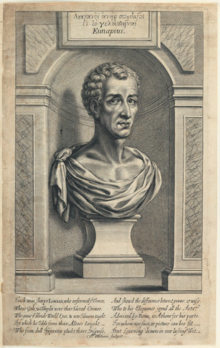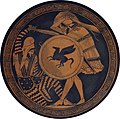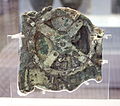Portal:Ancient Greece
The Ancient Greece Portal

Ancient Greece (Greek: Ἑλλάς, romanized: Hellás) was a northeastern Mediterranean civilization, existing from the Greek Dark Ages of the 12th–9th centuries BC to the end of classical antiquity (c. 600 AD), that comprised a loose collection of culturally and linguistically related city-states and other territories. Most of these regions were officially unified only once, for 13 years, under Alexander the Great's empire from 336 to 323 BC. In Western history, the era of classical antiquity was immediately followed by the Early Middle Ages and the Byzantine period.
Three centuries after the Late Bronze Age collapse of Mycenaean Greece, Greek urban poleis began to form in the 8th century BC, ushering in the Archaic period and the colonization of the Mediterranean Basin. This was followed by the age of Classical Greece, from the Greco-Persian Wars to the 5th to 4th centuries BC, and which included the Golden Age of Athens. The conquests of Alexander the Great spread Hellenistic civilization from the western Mediterranean to Central Asia. The Hellenistic period ended with the conquest of the eastern Mediterranean world by the Roman Republic, and the annexation of the Roman province of Macedonia in Roman Greece, and later the province of Achaea during the Roman Empire.
Classical Greek culture, especially philosophy, had a powerful influence on ancient Rome, which carried a version of it throughout the Mediterranean and much of Europe. For this reason, Classical Greece is generally considered the cradle of Western civilization, the seminal culture from which the modern West derives many of its founding archetypes and ideas in politics, philosophy, science, and art. (Full article...)
Selected article -

The military nature of Mycenaean Greece (c. 1600–1100 BC) in the Late Bronze Age is evident by the numerous weapons unearthed, warrior and combat representations in contemporary art, as well as by the preserved Greek Linear B records. The Mycenaeans invested in the development of military infrastructure with military production and logistics being supervised directly from the palatial centres.
Late Bronze Age Greece was divided into a series of warrior kingdoms, the most important being centered in Mycenae, to which the culture of this era owes its name, Tiryns, Pylos and Thebes. From the 15th century BC, Mycenaean power started expanding towards the Aegean, the Anatolian coast and Cyprus. Mycenaean armies shared several common features with other contemporary Late Bronze Age powers: they were initially based on heavy infantry, with spears, large shields and in some occasions armor. In the 13th century BC, Mycenaean units underwent a transformation in tactics and weaponry and became more uniform and flexible and their weapons became smaller and lighter. Some representative types of Mycenaean armor/weapons were the boar's tusk helmet and the "Figure-of-eight" shield. Moreover, most features of the later hoplite panoply of Classical Greece were already known at this time. (Full article...)Selected location -
Did you know...
- ... that the Greeks did not have a term for "religion"?
- ... that Ancient Greek cuisine was characterized by its frugality, reflecting agricultural hardship?
- ... that the economy of ancient Greece was characterized by the extreme importance of agriculture, all the more so because of the relative poverty of Greece's soil?
Related portals
Selected biography -
Lucian of Samosata (c. 125 – after 180) was a Hellenized Syrian satirist, rhetorician and pamphleteer who is best known for his characteristic tongue-in-cheek style, with which he frequently ridiculed superstition, religious practices, and belief in the paranormal. Although his native language was probably Syriac, all of his extant works are written entirely in ancient Greek (mostly in the Attic Greek dialect popular during the Second Sophistic period).
Everything that is known about Lucian's life comes from his own writings, which are often difficult to interpret because of his extensive use of sarcasm. According to his oration The Dream, he was the son of a lower middle class family from the city of Samosata along the banks of the Euphrates in the remote Roman province of Syria. As a young man, he was apprenticed to his uncle to become a sculptor, but, after a failed attempt at sculpting, he ran away to pursue an education in Ionia. He may have become a travelling lecturer and visited universities throughout the Roman Empire. After acquiring fame and wealth through his teaching, Lucian finally settled down in Athens for a decade, during which he wrote most of his extant works. In his fifties, he may have been appointed as a highly paid government official in Egypt, after which point he disappears from the historical record. (Full article...)List of selected biographies
|
|---|
General images -
Selected picture

Photo credit: ?
Ruins of the Ancient Olympic Games training grounds at Olympia.The historical origins of the Ancient Olympic Games are unknown, but several legends and myths have survived. One of these involved Pelops, king of Olympia and eponymous hero of the Peloponnesus, to whom offerings were made during the games.
Topics
Life: Agriculture · Art · Cuisine · Democracy · Economy · Language · Law · Medicine · Paideia · Pederasty · Pottery · Prostitution · Slavery · Technology · Olympic Games
Philosophers: Pythagoras · Heraclitus · Parmenides · Protagoras · Empedocles · Democritus · Socrates · Plato · Aristotle · Zeno · Epicurus
Authors: Homer · Hesiod · Pindar · Sappho · Aeschylus · Sophocles · Euripides · Aristophanes · Menander · Herodotus · Thucydides · Xenophon · Plutarch · Lucian · Polybius · Aesop
Buildings: Parthenon · Temple of Artemis · Acropolis · Ancient Agora · Arch of Hadrian · Temple of Zeus at Olympia · Colossus of Rhodes · Temple of Hephaestus · Samothrace temple complex
Chronology: Aegean civilization · Minoan Civilization · Mycenaean civilization · Greek dark ages · Classical Greece · Hellenistic Greece · Roman Greece
People of Note: Alexander The Great · Lycurgus · Pericles · Alcibiades · Demosthenes · Themistocles · Archimedes · Hippocrates
Art and Sculpture: Kouroi · Korai · Kritios Boy · Doryphoros · Statue of Zeus · Discobolos · Aphrodite of Knidos · Laocoön · Phidias · Euphronios · Polykleitos · Myron · Parthenon Frieze · Praxiteles
Subcategories
Things to do
 |
Here are some tasks awaiting attention:
|
Associated Wikimedia
The following Wikimedia Foundation sister projects provide more on this subject:
-
Commons
Free media repository -
Wikibooks
Free textbooks and manuals -
Wikidata
Free knowledge base -
Wikinews
Free-content news -
Wikiquote
Collection of quotations -
Wikisource
Free-content library -
Wikiversity
Free learning tools -
Wiktionary
Dictionary and thesaurus























































